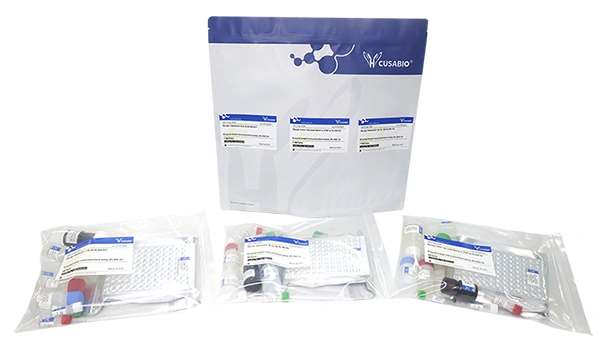Heterozygous de novo dominant negative mutation of REXO2 results in
interferonopathy. Nat Commun, 2024.
In this study, inflammatory cytokines (e.g., IFNα, IFNβ, TNFα) served as core
biomarkers that validated the mechanism whereby REXO2 mutation activates the MDA5 pathway via
mitochondrial RNA leakage, leading to an interferonopathy. Furthermore, these cytokines functioned as key
effector molecules driving patient phenotypes (such as cutaneous inflammation and hyper-IgE) and represent
potential therapeutic targets (e.g., response to JAK inhibitors).
References: Heterozygous de novo dominant negative mutation of REXO2 results in
interferonopathy. Nat Commun, 2024.
High-fat diet-induced L-saccharopine accumulation inhibits estradiol synthesis and
damages oocyte quality by disturbing mitochondrial homeostasis. Gut Microbes, 2024.
Research indicates that pro-inflammatory cytokines (e.g., TNF-α, IL-1β, IL-6) act as
pivotal mediators linking high-fat diet-induced gut dysbiosis to ovarian dysfunction. Specifically,
following the compromise of intestinal barrier integrity and activation of the ovarian TLR4/NF-κB
signaling pathway, these cytokines directly impair ovarian function—independent of metabolic
disturbances—by suppressing the expression of estrogen-synthesizing enzymes and exacerbating follicular
apoptosis
References: High-fat diet-induced L-saccharopine accumulation inhibits estradiol
synthesis and damages oocyte quality by disturbing mitochondrial homeostasis. Gut Microbes, 2024.
Prenatal and postnatal exposure to polystyrene microplastics induces testis
developmental disorder and affects male fertility in mice. J Hazard Mater, 2023.
In this study, inflammatory cytokines (e.g., IL-6, TNF-α, IL-10, TGF-β) were identified
as the key mechanism underlying PS-MPs-induced spermatogenic dysfunction, wherein they mediate an
imbalance in the testicular immune microenvironment. This sustained inflammatory response consequently
disrupts spermatogonial differentiation, meiosis, and the integrity of the blood-testis barrier.
References: Prenatal and postnatal exposure to polystyrene microplastics induces
testis developmental disorder and affects male fertility in mice. J Hazard Mater, 2023.
A SARS-CoV-2-specific CAR-T-cell model identifies felodipine, fasudil, imatinib, and
caspofungin as potential treatments for lethal COVID-19. Cell Mol Immunol, 2023.
In the study, inflammatory cytokines (e.g., IL-8, IFN-γ) served a dual role: as key
biomarkers reflecting the severity of the cytokine storm in COVID-19 patients, and as core indicators for
evaluating the anti-inflammatory efficacy of candidate drugs (felodipine, fasudil, imatinib, caspofungin).
References: A SARS-CoV-2-specific CAR-T-cell model identifies felodipine, fasudil,
imatinib, and caspofungin as potential treatments for lethal COVID-19. Cell Mol Immunol, 2023.
ACT001 Ameliorates ionizing radiation-induced lung injury by inhibiting NLRP3
inflammasome pathway. Biomed Pharmacother, 2023.
In radiation-induced lung injury (RILI), key mediators including IL-1β (an effector of
the NLRP3 pathway), IL-6, TNF-α (pro-inflammatory factors), and TGF-β1 (a key driver of fibrosis)
collectively exacerbate inflammatory infiltration and collagen deposition. ACT001 significantly reduces
the levels of these cytokines by inhibiting the NLRP3 inflammasome, thereby alleviating both pulmonary
inflammation and the progression of fibrosis.
References: ACT001 Ameliorates ionizing radiation-induced lung injury by inhibiting
NLRP3 inflammasome pathway. Biomed Pharmacother, 2023.
Anti‑inflammatory effect of metformin against an experimental model of LPS‑induced
cytokine storm. Exp Ther Med, 2023.
The study demonstrated that metformin administered via both routes significantly
suppressed the LPS-induced increase in levels of IL-1, IL-6, and TNF-α, with intraperitoneal injection
showing a more pronounced reduction in IL-6. However, neither administration method had a significant
effect on IL-17 levels. These findings suggest that by inhibiting the pro-inflammatory cytokine storm,
metformin may have potential therapeutic value for human diseases driven by elevated cytokine levels.
References: Anti‑inflammatory effect of metformin against an experimental model of
LPS‑induced cytokine storm. Exp Ther Med, 2023.


